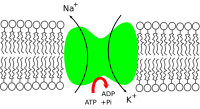
Photo from wikipedia
BACKGROUND China has one of the highest salt intake levels in the world, and Chinese people form one of the largest foreign-born communities now living in Europe. The present study… Click to show full abstract
BACKGROUND China has one of the highest salt intake levels in the world, and Chinese people form one of the largest foreign-born communities now living in Europe. The present study was performed to assess 24-hour urinary sodium and potassium excretion in Chinese migrants in Italy and to explore possible associations with hypertension, hypertension awareness, and length of residence in Italy. METHODS A cross-sectional evaluation was conducted on 319 first-generation Chinese migrants (154 women and 165 men) aged 18-70 years. Subjects were asked to do a 24-hour urine collection and the relationships of urinary sodium and potassium and arterial blood pressure, hypertension (BP ≥ 140/90 mmHg or anti-hypertensive drug use), hypertension awareness, and years of residence in Italy were investigated with linear or logistic regression analysis. RESULTS Sodium excretion was 145.2 mmol/day (95%CI 138.0-152.3) in men, and 134.7 (95%CI 127.6-141.8) in women corresponding to a dietary salt intake of 9.4 g/day (95%CI 9.0-9.9) and 8.8 (95%CI 8.3-9.2) respectively. Potassium excretion was 35.1 mmol/day (95%CI 33.6-36.5), with no significant difference by gender. At multivariable adjusted linear regression analysis body mass index, low education level, and hypertension were positive predictors of sodium urinary excretion; gender (women), and body mass index were positive predictors of potassium excretion. Sodium and potassium excretion were unaffected by hypertension awareness or years of residence in Italy. CONCLUSIONS Sodium excretion in Chinese workers is higher than recommended and in line with high salt intake in Italy. Potassium consumption remains low.
Journal Title: International journal of cardiology
Year Published: 2019
Link to full text (if available)
Share on Social Media: Sign Up to like & get
recommendations!